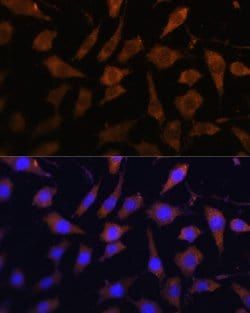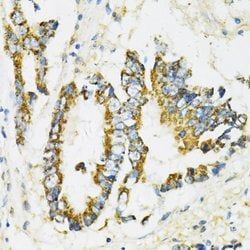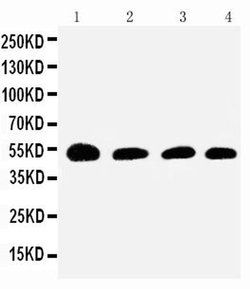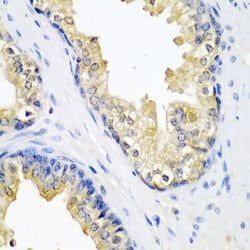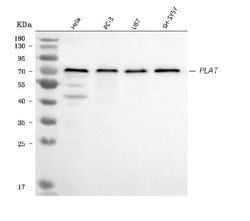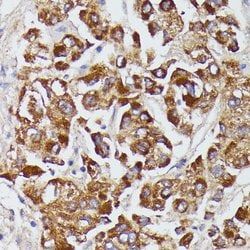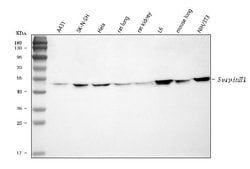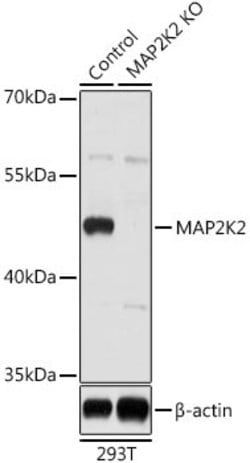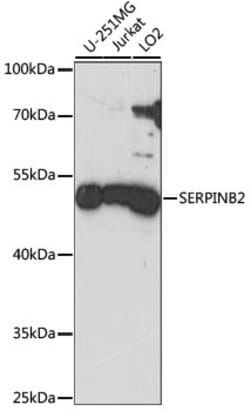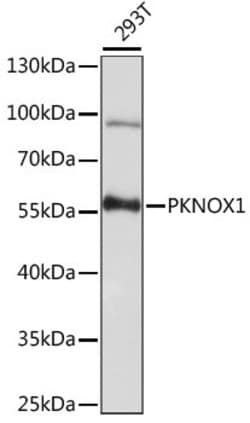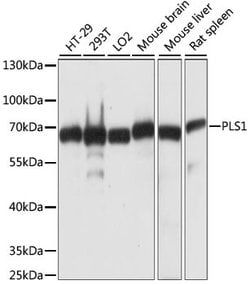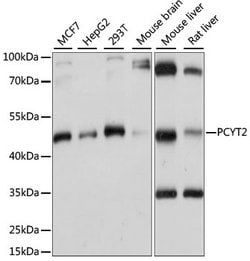SERPINB2 Polyclonal Antibody, Invitrogen™
Manufacturer: Thermo Scientific
Select a Size
| Pack Size | SKU | Availability | Price |
|---|---|---|---|
| Each of 1 | PIPA590357-Each-of-1 | In Stock | ₹ 46,502.50 |
PIPA590357 - Each of 1
In Stock
Quantity
1
Base Price: ₹ 46,502.50
GST (18%): ₹ 8,370.45
Total Price: ₹ 54,872.95
Antigen
SERPINB2
Classification
Polyclonal
Conjugate
Unconjugated
Gene
SERPINB2
Gene Alias
HsT1201, Monocyte Arg-serpin, ovalbumin, PAI, Pai2, PAI-2, Pai2a, Placental plasminogen activator inhibitor, Planh2, Plasminogen activator inhibitor 2, plasminogen activator inhibitor 2 type A, Plasminogen activator inhibitor 2, macrophage, plasminogen activator inhibitor, type II, plasminogen activator inhibitor, type II (arginine-serpin), serine (or cysteine) peptidase inhibitor, clade B, member 2, serine (or cysteine) proteinase inhibitor, clade B (ovalbumin), member 2, serine (or cysteine) proteinase inhibitor, clade B, member 2, serpin B2, serpin family B member 2, serpin peptidase inhibitor, clade B (ovalbumin), member 2, SERPINB2, Urokinase inhibitor
Host Species
Rabbit
Purification Method
Affinity Chromatography
Regulatory Status
RUO
Gene ID (Entrez)
5055
Content And Storage
-20° C, Avoid Freeze/Thaw Cycles
Form
Liquid
Applications
Western Blot
Concentration
1.64 mg/mL
Formulation
PBS with 50% glycerol and 0.01% thimerosal, pH 7.3
Gene Accession No.
P05120
Gene Symbols
SERPINB2
Immunogen
Recombinant fusion protein containing a sequence corresponding to amino acids 1-415 of human SERPINB2 (NP_0025661)
Quantity
100 μL
Primary or Secondary
Primary
Target Species
Human
Product Type
Antibody
Isotype
IgG
Description
- Immunogen sequence: MEDLCVANTL FALNLFKHLA KASPTQNLFL SPWSISSTMA MVYMGSRGST EDQMAKVLQF NEVGANAVTP MTPENFTSCG FMQQIQKGSY PDAILQAQAA DKIHSSFRSL SSAINASTGN YLLESVNKLF GEKSASFREE YIRLCQKYYS SEPQAVDFLE CAEEARKKIN SWVKTQTKGK IPNLLPEGSV DGDTRMVLVN AVYFKGKWKT PFEKKLNGLY PFRVNSAQRT PVQMMYLREK LNIGYIEDLK AQILELPYAG DVSMFLLLPD EIADVSTGLE LLESEITYDK LNKWTSKDKM AEDEVEVYIP QFKLEEHYEL RSILRSMGME DAFNKGRANF SGMSERNDLF LSEVFHQAMV DVNEEGTEAA AGTGGVMTGR TGHGGPQFVA DHPFLFLIMH KITNCILFFG RFSSP; Positive Samples: U-251MG, Jurkat, LO2; Cellular Location: Cytoplasm, extracellular space PAI-2 is an inhibitory serpin expressed mainly in keratinocytes, activated monocytes, and placental trophoblasts
- It exists predominantly as a 47 kDa, nonglycosylated, intracellular protein, which can be induced to be secreted as 60 kDa glycoprotein
- The glycosylated and unglycosylated forms of PAI-2 are equally effective as inhibitors of urokinase-type plasminogen activator (uPA), the only established physiological target of this serpin
- PAI-2 has a unique ability to form dormant polymers spontaneously and reversibly under physiological conditions
- The physiological relevance of this property, which is neither a consequence of any mutation in the PAI-2 gene nor associated with any known disorder, is still unclear
- However, it appears that the formation of intracellular, dormant polymers may be important for the controlled release of the inhibitor from PAI-2 producing cells
- Plasma levels of PAI-2 are usually low or undetectable, except during pregnancy and in some forms of monocytic leukemia
- Secretion of PAI-2 from the placenta normally occurs during the third trimester of pregnancy, and accounts for the dramatic increase in PAI-2 levels (up to 250 ng/ml), which are maintained at these levels until postpartum, and then rapidly decline
- In addition to its vital role in protecting the placenta from degradation by uPA and/or uPA-activated proteases, PAI-2 has been shown to be essential for the prevention of metastatic spread of neck, lung and breast cancers
- The beneficial effect of PAI-2 seen in these studies is presumed to stem from its ability to inhibit uPA-dependent cell dissemination
- PAI-2 has also been reported to inhibit keratinocyte proliferation, and to participate in the innate immune response during viral infection.
